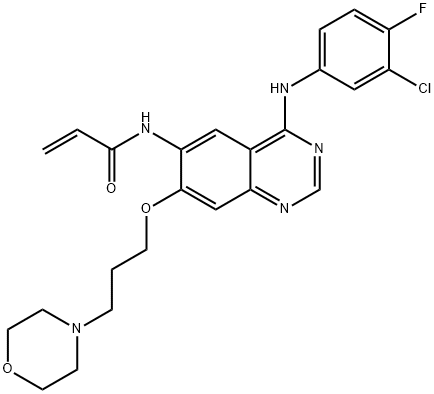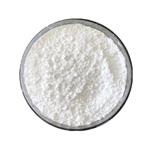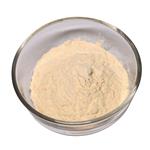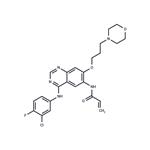Uses
Antineoplastic; irreversible pan-erbB tyrosine kinase inhibitor used to treat cancer.
Uses
CI-1033 is a potent inhibitor of EGFR and ErbB2 with IC50 of 1.5 nM and 9.0 nM, respectively.
Uses
Canertinib is a kind of irreversible pan-erbB tyrosine kinase inhibitor used to treat cancer.
Definition
ChEBI: A quinazoline compound having a 3-chloro-4-fluoroanilino group at the 4-position, a propenamido group at the 6-position, and a 3-morpholinopropoxy group at the 7-position.
Biological Activity
canertinib (also known as ci-1033), a 3-chloro, 4-fluoro, 4-anilinoquinazoline, is an orally available, potent and irreversible pan-erbb tyrosine kinase inhibitor that inhibits egfr, her2 and her4 in vitro with the half maximal inhibition concentration ic50 of 0.8 nm, 19 nm and 7 nm respectively [1].canertinib irreversibly binds into the atp pocket within the tk domain of all erbb family members, where the acrylamide side-chain at position c6 of canertinib is brought into close proximity with cysteines of erbb members, followed by the rapid formation of a covalent bond, which permanently inactivates the catalytically active erb1, erb2 and erb4 family members and effectively inhibits erbb3-dependent signaling [2].
References
[1] michelle arkin, mark m. moasser. her2 directed small molecule antagonists. curr opin investig drugs. author manuscript; available in pmc 2011 february 1. published in final edited form as: curr opin investig drugs. 2008 december; 9(12): 1264–1276.
[2] calvo e, tolcher aw, hammond la, patnaik a, de bono js, eiseman ia, olson sc, lenehan pf, mccreery h, lorusso p, rowinsky ek. administration of ci-1033, an irreversible pan-erbb tyrosine kinase inhibitor, is feasible on a 7-day on, 7-day off schedule: a phase i pharmacokinetic and food effect study. clin cancer res. 2004 nov 1;10(21):7112-20.



